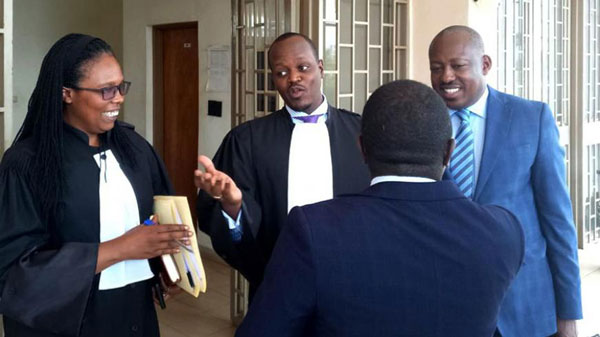
Kigali, Rwanda | KELLY RWAMAPERA | The Supreme Court in Rwanda has removed provisions in the penal code that criminalize drawing of ‘humiliating and defamatory’ cartoons against public servants and religious practices, but kept an exemption for the President.
The ruling on a constitutional petition that had been filed by a Kigali lawyer Richard Mugisha against five provisions in the penal code including articles that criminalize among others defamation and adultery, was made on Wednesday 24 April 2019 in Kigali.
The reading that took over an hour by four senior judges led by the Chief Justice Sam Rugege, concluded with the repealing of two provisions that criminalize humiliation and defamation through cartooning. and gestures against religion and public servants.
Two other provisions that criminalize humiliation and defamation through cartoons and insult against the president were maintained as the supreme court said the president was not an ordinary public servant.
The provisions that criminalize adultery, concubinage and desertion of marital homes remained but with an amendment that gives absolute power to the victim to withdraw the case even when it is in court.
Humiliation and defamation against religion
The supreme court observed that it was unconstitutional to criminalize drawing of cartoons or gestures against religious rituals because the country is not a theocratic state and the constitution guarantees freedom of press and expression.
“The constitution guarantees freedoms of press and expression of ideas whether against certain beliefs. The country also subscribes to international conventions which protects people’s rights of expression” the court observed.
Public servants
On the provision that criminalizes humiliation through cartooning and defamation against public servants, the Supreme Court ruled that it was against the constitution in which all people are equal before the law.
“There is no reason for harboring a provision that protects public servants against humiliation and defamation while other are left out” the court explained.
The Supreme Court further reasoned that the constitution makes Rwanda a country that stands on democratic values.
“It is undemocratic for public servants to be exempted from checks and balances of accountability through media” the court said ruling the repealing of the provision,” court ruled.
Defaming the president
On humiliation and defaming the president, the court drew a distinction between public servants and president where the latter represents the nation, a concrete ground for protecting the office holder against defamation.
“The president of the republic is a unique figure where defaming the president is equivalent to defaming the whole nation” the court observed.
The supreme court also mentioned that while public servants can seek justice against defamation in civil procedure, it is relegation to have the president to go down to civil courts for justice when defamed.
“It would be reducing the president’s dignity and obligation to direct him/her to seek justice against defamation from media association or civil courts” the court said.
Marital infidelities
On adultery, the court interpreted that the agreements between husband and wife should be protected by the government to prevent misery of family members and of society in general.
“Adultery drains finances of families in concubines and constrains the desired value of family planning”
The court established that for the sake of maintaining mutual consent among married couples, the victim of adultery shall have absolute power to withdraw the case even from court proceeding as long as they have had a consent with the partner.
Mugisha’s comments
After the court ruling, Mugisha told journalists that it was a win for him to have had his convictions about the penal code heard in the Supreme Court.
“We still think we gave the right arguments although we have been won in some others,” he said.
On his defeat on the decriminalization of defamation against the president, Mugisha said it is hard to protect the Head of State against defamation especially cartooning because of the involvement of media.
“The law doesn’t offer protection to the president because the media has evolved. There’re a lot of social media platforms which are impossible to be made answerable to the law”
The amended and repealed laws shall be published in the official gazette of the government.
 The Independent Uganda: You get the Truth we Pay the Price
The Independent Uganda: You get the Truth we Pay the Price


